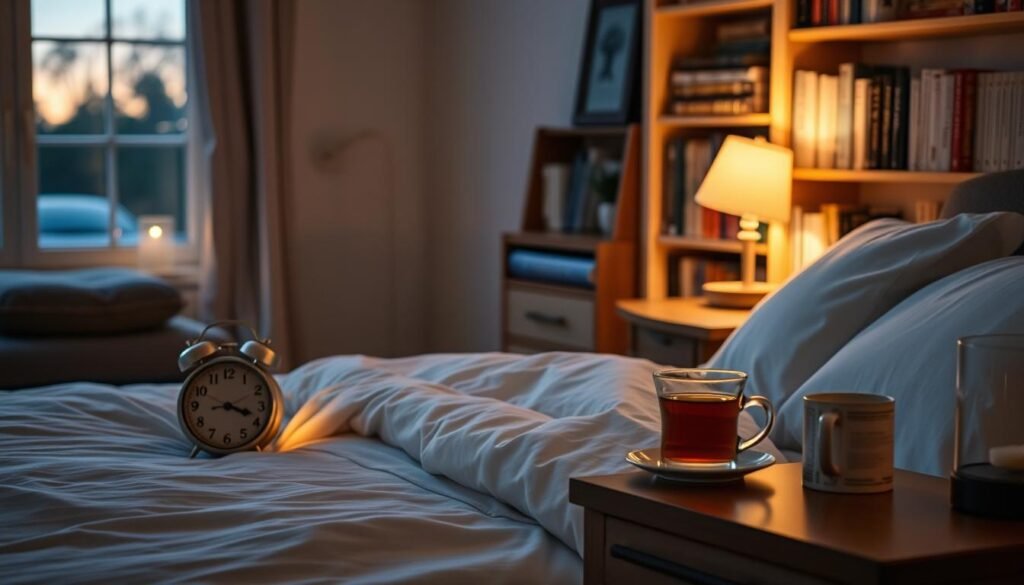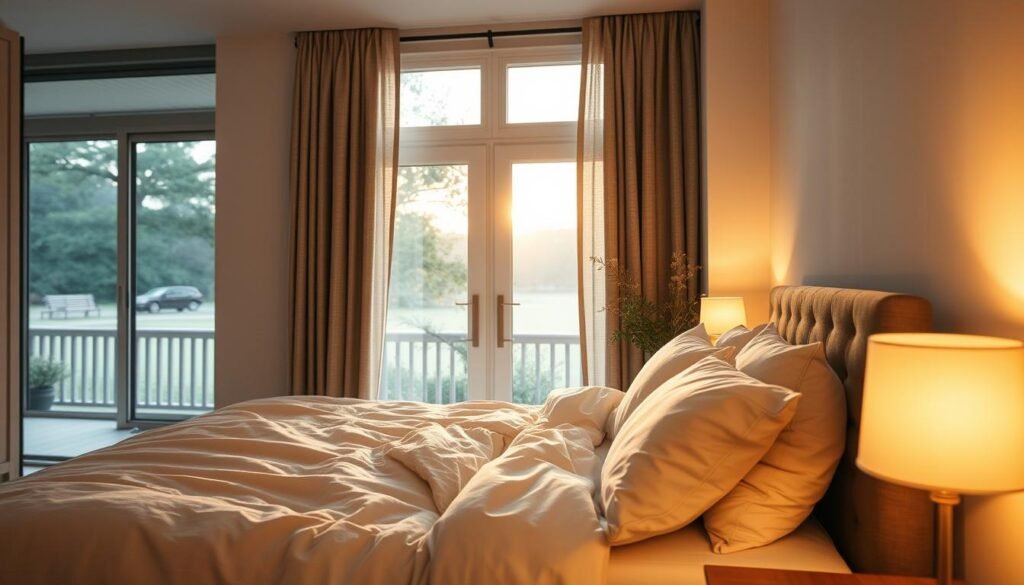How to Sleep Better Tonight: 10 Science-Backed Natural Remedies
A good night’s sleep is fundamental to our overall health and wellbeing. However, millions of Americans struggle with sleep disorders, affecting their daily lives and long-term health. The growing sleep crisis has sparked a growing interest in natural remedies that can improve sleep quality without relying on medication.
I have curated 10 science-backed natural remedies that are supported by research. These effective alternatives to sleep medications can lead to both immediate and long-term improvements in sleep. By implementing these strategies, individuals can expect to see a significant enhancement in their overall health and wellbeing.
Key Takeaways
- Discover the importance of quality sleep for overall health
- Learn about the growing sleep crisis in America and the rise of natural remedies
- Understand the criteria for selecting science-backed remedies for better sleep
- Explore the benefits of implementing these remedies for immediate and long-term sleep improvements
- Find out how these natural remedies are supported by research and can enhance overall wellbeing
The Science of Sleep: Why Quality Rest Matters
The science of sleep reveals why quality rest is essential for a healthy life. Understanding the intricacies of sleep can help us appreciate its role in maintaining our overall well-being.
The Sleep Crisis in America
The United States is facing a sleep crisis, with millions of Americans not getting the quality sleep they need. This issue is linked to various health problems, including cardiovascular disease, diabetes, and obesity. The consequences of poor sleep are far-reaching, affecting not just physical health but also mental well-being and productivity.
How Sleep Affects Your Overall Health
Adequate sleep is crucial for maintaining overall health. The benefits of quality sleep range from better heart health and less stress to improved memory and weight loss. During sleep, the body repairs and regenerates damaged cells, builds bone and muscle, and strengthens the immune system. Moreover, sleep plays a critical role in brain function, with research showing that it helps to clear out toxins that accumulate during the day.
Understanding Sleep Cycles and Quality
Sleep is not a uniform state but rather a dynamic process that involves different stages, including light sleep, deep sleep, and REM sleep. These stages are crucial for various aspects of health, from physical restoration to cognitive function. A full sleep cycle typically lasts between 90 to 120 minutes, and we cycle through these stages multiple times throughout the night. The hormone melatonin regulates our sleep-wake cycle, and disruptions to this natural process can significantly impact sleep quality.
| Sleep Stage | Characteristics | Health Benefits |
|---|---|---|
| Light Sleep | Easily awakened, slower brain waves | Prepares body for deeper sleep stages |
| Deep Sleep | Difficulty waking up, slow delta waves | Physical restoration, muscle repair |
| REM Sleep | Rapid eye movements, vivid dreams | Cognitive function, memory consolidation |
Understanding these sleep cycles and the factors that influence sleep quality can help individuals take steps to improve their sleep. By prioritizing sleep and creating an environment conducive to rest, we can enhance our overall health and well-being.
How to Sleep Better Tonight – 10 Natural Remedies Backed by Science
For those wondering how to sleep better tonight, there are 10 natural remedies that have been validated by scientific studies. These remedies not only promote better sleep but also contribute to overall well-being.
What Makes a Remedy “Science-Backed”?
A remedy is considered “science-backed” when it has been studied and proven effective through rigorous scientific research. This involves clinical trials and data analysis to confirm its benefits and understand its effects.
The Benefits of Natural Approaches to Sleep
Natural approaches to improving sleep offer several advantages over pharmaceutical medications. These natural remedies often have fewer side effects and do not lead to dependency. The benefits include:
- Addressing the root causes of sleep issues rather than just masking the symptoms.
- Providing multiple health benefits beyond just improving sleep.
- Offering sustainable, long-term treatment solutions.
- Allowing for safe combination with other natural remedies for enhanced effects.
- Empowering individuals to manage their sleep health without relying on medical intervention.

Remedy #1: Establish a Consistent Sleep Routine
To sleep better tonight, start by establishing a consistent sleep routine. This involves setting a regular sleep schedule that your body can rely on, even on weekends and holidays. By doing so, you’ll be helping your internal clock regulate your sleep-wake cycle more effectively.
The Power of Regularity for Your Internal Clock
A consistent sleep routine strengthens your body’s internal clock, making it easier to fall asleep and stay asleep. When you go to bed at the same time every night, your body gets into a habit, reducing the time it takes to fall asleep. This regularity is crucial for improving the overall quality of your sleep. It might seem tempting to sleep in on Saturdays, but doing so can disrupt your biological clock and lead to more sleep problems.
Tips for Creating an Effective Bedtime Ritual
Creating a bedtime ritual can signal to your body that it’s time to wind down. This can include activities like reading a book, gentle stretching, or meditation. The key is to start this ritual 30-60 minutes before bedtime and maintain it consistently. By personalizing your bedtime routine according to your preferences, you can make it more effective. For instance, if you’re traveling or facing disruptions, try to stick to your routine as closely as possible to minimize the impact on your sleep.

Remedy #2: Optimize Your Sleep Environment
Creating a sleep-conducive environment is a science-backed remedy for better sleep. This involves making several adjustments to your bedroom to make it a sanctuary that promotes restful sleep.
Temperature Control for Better Sleep
Maintaining an optimal bedroom temperature is crucial for quality sleep. The ideal temperature range is between 60°F and 67°F (15.5°C and 19.4°C). A cooler bedroom helps regulate your body’s internal temperature, promoting deeper sleep. Using a programmable thermostat can help maintain this optimal temperature range, ensuring your bedroom is always at a comfortable temperature for sleeping.
Creating a Dark, Quiet Sleep Sanctuary
A dark and quiet environment is essential for improving sleep quality. Blackout curtains or blinds can effectively block out light, while earplugs or a white noise machine can minimize disturbing sounds. These adjustments help signal to your brain that it’s time to sleep, enhancing the quality of your rest.

Reserving Your Bed for Sleep Only
Associating your bed with sleep is vital for improving sleep quality. This means avoiding activities like working, watching TV, or scrolling through your phone in bed. By reserving your bed for sleep and intimacy, you strengthen the mental association between your bed and sleeping, making it easier to fall asleep. For those living in studio apartments or with limited space, using a room divider or screen can help delineate the sleep area, supporting this mental association.
| Aspect | Ideal Condition | Benefit |
|---|---|---|
| Temperature | 60°F – 67°F (15.5°C – 19.4°C) | Promotes deeper sleep |
| Light | Dark | Regulates circadian rhythms |
| Noise | Quiet | Reduces sleep disturbances |
Remedy #3: Mindful Eating and Drinking Habits
The food and beverages you consume can either promote or hinder a good night’s sleep. Being mindful of your eating and drinking habits can significantly improve the quality of your rest.

Timing Your Meals for Optimal Sleep
Eating your last meal of the day too close to bedtime can disrupt your sleep patterns. It’s recommended to finish eating at least 2-3 hours before going to bed to allow for proper digestion. This timing helps in preventing discomfort and indigestion that can interfere with falling asleep.
Foods That Promote Better Sleep
Certain foods can promote better sleep. These include foods rich in melatonin, serotonin, and complex carbohydrates. Examples are cherries, almonds, and whole-grain bread. Incorporating these foods into your diet, especially in the evening, can help improve sleep quality.
Substances to Avoid Before Bedtime
It’s crucial to avoid consuming substances like caffeine and alcohol close to bedtime. Caffeine can block adenosine receptors, making it hard to fall asleep even when consumed several hours before bed. Similarly, while alcohol may induce sleep initially, it disrupts the sleep cycle and reduces the quality of sleep, leading to poor rest and potential effects on overall health.
Remedy #4: Regular Physical Activity
Incorporating regular physical activity into your daily routine can significantly enhance sleep quality. Exercise is a natural way to promote better rest by influencing various physiological processes.
How Exercise Improves Sleep Quality
Regular exercise has been shown to have a positive impact on sleep. Physical activity can help regulate the body’s internal clock and reduce stress and anxiety, making it easier to fall asleep and stay asleep. Exercise also affects the body’s temperature regulation, which can promote a deeper sleep.
Best Times to Exercise for Sleep Benefits
The time of day you exercise can influence its effects on sleep. Research suggests that morning or afternoon exercise may be optimal for most people, as it allows for a window of several hours between physical activity and bedtime. This timing helps avoid potential interference with sleep onset due to increased body temperature and hormone levels associated with exercise.
It’s essential to note that while evening exercise can be detrimental to sleep for some, gentle activities like yoga or stretching can actually promote relaxation and prepare the body for rest.
- Morning or afternoon exercise is generally recommended for better sleep.
- Avoid vigorous exercise within a few hours of bedtime.
- Gentle evening activities like yoga can be beneficial for relaxation.
Remedy #5: Herbal Teas and Supplements
Herbal teas and supplements have been used for centuries to promote relaxation and improve sleep. These natural remedies offer a gentle yet effective approach to addressing sleep issues.
Chamomile: A Traditional Sleep Aid
Chamomile tea is a well-known herbal remedy for sleep. Steeped in tradition, chamomile has been used for its calming effects. To prepare chamomile tea, steep 1-2 teaspoons of dried flowers in hot water for 5-10 minutes.

Valerian Root: Nature’s Sedative
Valerian root is another popular herbal supplement used to improve sleep quality. It acts as a natural sedative, promoting relaxation and reducing stress. Valerian root supplements are available in capsule or tincture form.

Lemon Balm and Other Calming Herbs
Beyond chamomile and valerian, other herbs like lemon balm, passionflower, and lavender offer calming effects that can aid sleep. Lemon balm, in particular, has been shown to reduce anxiety and stress by acting as a GABA agonist. To make lemon balm tea, steep ¼ to 1 teaspoon of dried herb in hot water.
The benefits of these herbs can be enhanced when combined. For instance, lemon balm can be used alongside other calming herbs to create a synergistic effect that promotes better sleep.
When using herbal teas and supplements, it’s essential to consider preparation methods and dosages. For example, capsules of lemon balm extract are typically taken at doses of 300-500 milligrams up to three times a day.
While herbal remedies can be effective, safety considerations are crucial. Potential interactions with medications and certain health conditions necessitate caution. Always consult with a healthcare professional before adding new supplements to your regimen.
Remedy #6: Digital Detox Before Bed
The relationship between screen time and sleep quality is complex, but science offers clear guidance on how to mitigate its effects. In today’s digital landscape, it’s easy to get caught up in the habit of scrolling through our devices before bed, but this can have significant consequences for our sleep.
The Impact of Blue Light on Melatonin Production
One of the primary ways that technology affects our sleep is through the emission of blue light from our devices. This type of light can suppress the production of melatonin, the hormone that regulates our sleep-wake cycles. Studies have shown that exposure to blue light in the evening can delay melatonin production, making it harder to fall asleep and reduce the quality of our sleep.
Creating a Technology-Free Bedtime Routine
To improve your sleep, consider implementing a technology-free bedtime routine. Start by putting your gadgets away at least an hour before bedtime to help your body wind down. Instead of scrolling through your phone, try reading a physical book, journaling, or practicing gentle stretches. For those who need to use devices in the evening, using blue light filters or night mode settings can help mitigate the negative effects. Gradually introducing these changes can make it easier to stick to a technology-free routine and improve the quality of your sleep at night.
| Activity | Before Bedtime | Alternative |
|---|---|---|
| Screen Time | Can suppress melatonin production | Reading or journaling |
| Device Usage | Emits blue light | Gentle stretches or meditation |
By making these simple changes, you can take a significant step towards improving your sleep quality and waking up feeling more refreshed and revitalized.
Remedy #7: Stress Management Techniques
Effective stress management is key to achieving restful sleep. When we’re stressed, our bodies produce stress hormones like cortisol, which can interfere with our ability to fall asleep and stay asleep. By incorporating stress management techniques into our daily routine, we can improve our sleep quality and overall well-being.
Breathing Exercises for Better Sleep
Breathing exercises are a simple yet powerful tool for managing stress and promoting better sleep. Techniques like diaphragmatic breathing, also known as belly breathing, can help calm the mind and slow down the heart rate. To practice diaphragmatic breathing, lie on your back with one hand on your belly and the other on your chest. Inhale deeply through your nose, allowing your belly to rise as your diaphragm descends. Exhale slowly through your mouth, feeling your belly fall as your diaphragm rises. Regular practice of this technique can lead to improved sleep quality and reduced stress levels.
Meditation and Mindfulness Practices
Meditation and mindfulness practices are effective stress management techniques that can also improve sleep. Mindfulness meditation involves focusing on the present moment, often through attention to the breath or a mantra, to quiet the mind and reduce stress. Research has shown that regular meditation practice can lead to reduced sleep latency and improved sleep quality. Simple techniques like body scan meditation, where you focus on different parts of your body, releasing tension as you go, can be particularly helpful before bed. Incorporating mindfulness into daily activities can also have a cumulative effect on nighttime sleep quality.
| Technique | Description | Benefits |
|---|---|---|
| Diaphragmatic Breathing | Lie on your back, inhale deeply through your nose, allowing your belly to rise. | Reduces stress, promotes relaxation |
| Body Scan Meditation | Focus on different parts of your body, releasing tension. | Promotes relaxation, reduces sleep latency |
| Mindfulness Meditation | Focus on the present moment, often through attention to the breath. | Reduces stress, improves sleep quality |
Conclusion: Your Path to Restorative Sleep
The path to restorative sleep is multifaceted, and the 10 natural remedies discussed provide a comprehensive foundation for improvement. By combining these science-backed remedies, you can tailor a sleep improvement plan that suits your unique needs. Start with one or two simple changes, such as establishing a consistent sleep routine or optimizing your sleep environment, and gradually build upon them. Improving sleep quality is a gradual process that requires consistent effort, but the impact on your overall health and wellbeing can be transformative. With patience and persistence, you can achieve a good night’s sleep and wake up feeling refreshed and revitalized, ready to take on the night and the day ahead.
FAQ
What are the most effective ways to improve sleep quality?
Can certain foods or drinks affect my ability to fall asleep?
Is it beneficial to exercise regularly for sleep?
Can melatonin supplements help with insomnia?
What are some effective stress management techniques for better sleep?
Can a dark, quiet sleep sanctuary really improve sleep quality?
editor's pick
latest video
news via inbox
Nulla turp dis cursus. Integer liberos euismod pretium faucibua




